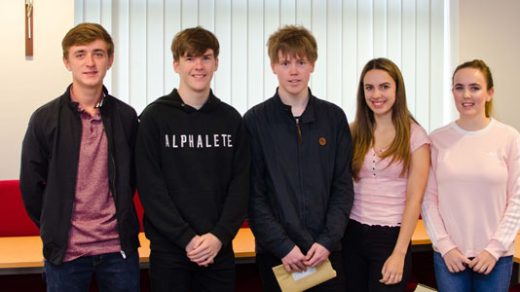Unveiling A-level Results Day Insights: Tech Experts Envision the Future of STEM

While some who received their A-level results on 17 August will take the traditional route of heading straight for university, some others may pursue apprenticeships, or even take the time to decide their preferred next steps.
Whatever the decision made, it is clear the world of work is drastically changing with the emergence of generative AI. Those finishing their education are facing the prospect of entering employment with artificial intelligence (AI) embedded into a significant number of organisations.
However, the UK is still suffering from a digital skills gap. A recent Microsoft study has revealed that 82 percent of UK jobs already require digital skills, and that 69 percent of leaders feel their organisation suffers from a digital skills gap. A crucial problem faced is the remaining gender diversity gap in STEM careers, something which must be addressed.
Despite whatever results were achieved yesterday, A-level results that come in lower than expected do not close doors for a career in technology or STEM in general.
Five tech experts share their opinions on the significance of this A-level results day below:
Tacking gender diversity
EJ Cay, vice president of UK and Ireland at software company Genesys, believes a wealth of opportunities await within the technology industry, and hopes numerous individuals will embrace careers in STEM. However, she said she is aware a persistent gender imbalance pervades the tech sector.
EJ said: “To address the technology industry’s gender imbalance long-term, it is pivotal young women feel empowered to pursue STEM subjects.
“Comprehensive education and mentorship programmes should promote STEM as welcoming fields where women can thrive. Ongoing encouragement from teachers, parents, peers, and role models is also equally vital to nurture confidence.
“Education not only equips students with knowledge, but also instils the self-belief to envision themselves in technology roles.”
She said: “By fuelling girls’ early passions for STEM and building their capabilities, we can drive meaningful progress in diversifying the tech workforce. A-level results day represents a key chance to reaffirm this important mission.”
Caroline Vignollet, senior vice president of research and development at cybersecurity technology company OneSpan takes a similar stance, saying: “In a male-dominated technology industry, the UK is grappling with a significant gender diversity issue.
“The imbalance starts at a young age, with only 19% of A-level computer science entries being female last year. This has led to a mere 13% of STEM workforce employees being women.
“Consequently, girls not only lack female role models in STEM sectors but are also missing out on incredibly rewarding careers.”
She added: “Gender diversity is integral in the field of technology. A diverse range of perspectives facilitates fresh approaches to solutions, strategies, team building, and thinking.
“It also brings a unique perspective to the given environment. Embracing our differences and fostering mutual learning is essential to drive innovation and progress.”
Navigating the AI working landscape
Ed Challis, head of AI strategy at software company UiPath, said: “Future generations are catalysts for societal change and the skills they learn through examined qualifications will set the precedent for careers of the future.
“A-levels continue to be a crucial stepping stone for those looking to pursue a career in technology. With this in mind, something educators must be prepared for is a workplace where automation and AI will play a major role. Moreover, the automation and AI-first mindset young people will arrive with and how they undertake learning will be vastly different from generations before.
“UiPath research found that, already, younger people are more receptive to AI-powered tools to help with mundane tasks, with 69% of Gen Z saying they think automation will help them do tasks better. As we have historically seen with secondary education, implementing technology opens new fields to study and ultimately leaves room for students to acquire more fulfilling expertise.”
James Fisher, chief strategy officer at software company Qlik also recognises how the world of work is being changed by AI.
James said: “A-level results day is a big occasion for anyone aspiring to pursue a career in STEM. From an educational standpoint, a solid background in coding and maths will provide a great foundation for any student with these ambitions.
“The ‘Data Skills Gap Report’ published by the UK government in 2021 found there are approximately 234,000 data-related roles waiting to be filled in British companies, which contrasts with the at most 10,000 data scientists that graduate every year from UK universities.
“And with the development of generative AI, which is reliant on trusted good quality enterprise data to train enterprise models, the need for data scientists is only going to increase. This shows why it is so crucial to familiarise students with data as early in their education as possible. We highly encourage schools across the country to make data part of their curriculum.”
No single path for a career in technology
Keiron Shepherd, solutions architect of EMEA (Europe, the Middle East and Africa) at technology company F5 points out going straight to university to then pursue a career in technology is far from the only route: “It’s important to note other paths for a career in technology or cybersecurity can be just as fruitful.
“Apprenticeships, including degree apprenticeships, are valuable options. They offer opportunities to hit the ground running and immerse themselves into working in industry, while attaining your skills and degree, have proven valuable.
“My main advice to anyone looking to kickstart their career in this field would be to get certified. Industry certifications are sometimes more relevant to employers than a degree. I would also encourage prospects to get involved in the community. These help candidates to build their networks and learn from industry experts.”







